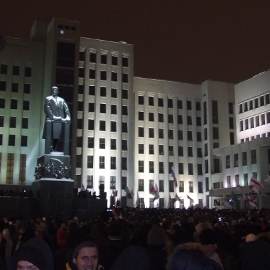Dissecting the Dream
December 23, 2011 -
Annabelle Chapman
-
Bez kategorii

plpaz2_mm_s.jpg
One year has passed since Belarus’s latest Presidential election. On 19 December 2010, Alexander Lukashenko was reelected in a rigged contest and the resulting protests repressed with unprecedented brutality. These events are revisited in a new documentary film, Belarusian Dream (Белорусская мечта, in Russian).
Premiered in secret in Minsk in November, the film was directed by Ekaterina Kibalchich, a young journalist. Born in Minsk in 1982, she studied journalism at Belarusian State University before moving to Moscow, where she works at Russian television’s Channel One. This, her third film, uses original video footage interspersed with news coverage. In just under an hour, it summarises Belarus’s political trajectory since 1991 before focusing on the 2010 election and its aftermath.
We follow the footsteps of the young, fictional narrator, who grew up in Minsk. He remembers the taste of ice-cream in the Soviet Union, and the hope exuded by Belarus’s Independence in 1991. The film opens somewhat like Wolfgang Becker’s acclaimed film Goodbye Lenin, set during the last days of the GDR. But Kibalchich’s film does not stop here and instead moves on to the surprising election of Alexander Lukashenko – who ran a state farm, before running the country – in 1994. Initially, this result was dismissed as a semi-comic “mistake” that could be corrected at the next elections. But he stayed on, bolstered by Belarus’s relatively good economic performance, until the recent crisis forced people to rethink their support. This brings us to last year’s Presidential elections.
Icy weather, people in hats gathered on the main square, coloured flags flying: pictures that recall Ukraine’s Orange Revolution of December 2004. But in Minsk in 2010, there was no recount of the vote and protestors were beaten and arrested, including seven out of the nine candidates running against Lukashenko. Although the film is critical of the opposition’s disunity, it shudders at its frightful plight following the elections. There is a poignant portrait of the candidates’ wives, who actively supported their imprisoned husbands rather than “stay at home and cook borsch” (which is what the chair of the Electoral Commission – a woman herself – recommended that they do).
December 2010 is portrayed, above all, as a popular awakening. The state controlled the television, but the people had “the internet and the streets”. And this resurfaced over the summer, when waves of “silent protests”, with no need for placards or slogans, tantalised the authorities. “Everyone understood what the silence is about”, explains the narrator. All dictators die eventually: Stalin died, and this week North Korea’s Kim Jong-Il died too. The question is what happens afterwards. The film recognises that, even without Lukashenko, Belarus will not change overnight and remains mildly sceptical towards both the Belarusian opposition and Western politicians. Nevertheless, it concludes buoyantly: the narrator’s dream for his country’s future is shared by countless other Belarusians, and their numbers are growing.
Belarusian Dream is fresh and personal despite its serious political subject matter. It is also a story, told by its faceless narrator, of collective hopes and disappointments. Kibalchich has created a quality documentary that speaks to an international audience. Since its premiere in Minsk, the film has been shown abroad, notably at the Watch Docs International Human Rights Festival in Warsaw earlier this month (where it won the Audience Award).
Annabelle Chapman is a postgraduate student in Russian and East European Studies at Oxford University.
The whole film, with English subtitles, can be watched online at http://www.youtube.com/watch?v=5bKmNN0GdN4&context=C2ceb2ADOEgsToPDskJOQ8XIPEjfXD6GQLplGWg


































